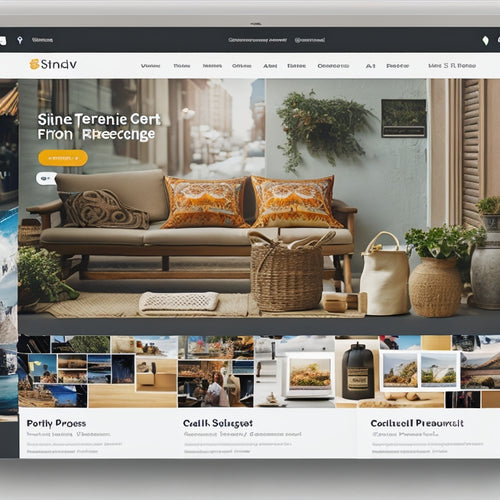
How Does Shopify Help Marketing
Share
This article examines the ways in which Shopify aids in marketing strategies. By analyzing the benefits of Shopify for marketing, discussing effective marketing tips for e-commerce success, exploring tutorials available for Shopify marketing, and delving into Shopify marketing analytics, this article provides a comprehensive understanding of how Shopify can support marketing efforts.
The objective and impersonal tone of this academic-style writing delivers concise and data-driven information to a wide audience seeking to enhance their marketing practices.
- Shopify enables enhanced customer targeting and personalization through customer segmentation based on demographics, behaviors, and preferences, leading to increased engagement and conversion.
- The platform simplifies sales tracking and data analysis, providing insights into customer behavior, preferences, and buying patterns, which allows for personalized customer experiences and enhances satisfaction and loyalty.
- Shopify helps improve conversion rates and website design by offering personalized product recommendations based on customer data, leading to higher conversion rates and increased likelihood of purchase.
- The platform facilitates seamless social media integration and brand building, leveraging social platforms to connect with the target audience, increase brand visibility, and build lasting relationships, fostering a sense of community and belonging among customers.
Benefits of Shopify for Marketing Strategies
Shopify offers a range of benefits for marketing strategies. These include enhanced customer targeting, simplified sales tracking, improved conversion rates, seamless social media integration, and streamlined email marketing.
With enhanced customer targeting, businesses can segment their audience based on demographics, behaviors, and preferences. This allows for more personalized marketing campaigns.
The simplified sales tracking feature allows businesses to easily monitor and analyze their sales data. This enables them to make data-driven decisions and optimize their marketing efforts.
Furthermore, Shopify's seamless social media integration and streamlined email marketing capabilities help businesses reach and engage with their customers across multiple channels. This ultimately improves their conversion rates.
Enhanced Customer Targeting
Enhanced customer targeting is a key aspect of utilizing marketing strategies effectively. Customer segmentation plays a crucial role in achieving this objective. By dividing the customer base into distinct groups based on characteristics such as demographics, behavior, and preferences, businesses can tailor their marketing efforts to specific segments.
Personalized advertising is an effective strategy to target these segments. It involves creating customized advertisements that resonate with individual customers, increasing the likelihood of engagement and conversion. Research shows that personalized advertising can significantly improve customer response rates and overall marketing effectiveness. For example, a study by Infosys found that 86% of consumers said personalization plays a role in their purchasing decisions.
Therefore, businesses that adopt customer segmentation and personalized advertising are better equipped to meet the needs and preferences of their target audience, fostering a sense of belonging and loyalty.
Simplified Sales Tracking
Simplified sales tracking optimizes the process of monitoring and analyzing sales data, improving efficiency and providing insights for informed decision-making.
By implementing a streamlined sales tracking system, businesses can effectively track their sales growth and identify areas for improvement. This data-driven approach allows businesses to monitor their sales performance in real-time, enabling them to make timely adjustments to their strategies.
Moreover, simplified sales tracking facilitates customer retention by providing valuable insights into customer behavior, preferences, and buying patterns. This information can be used to personalize the customer experience, tailor marketing efforts, and ultimately enhance customer satisfaction and loyalty.
With a data-driven approach to sales tracking, businesses can make informed decisions to drive sales growth and improve customer retention, ultimately fostering a sense of belonging among their target audience.
Improved Conversion Rates
Improved conversion rates are a key metric in evaluating the effectiveness of a business's sales strategies and can indicate the success of efforts to convert potential customers into actual buyers.
One way to improve conversion rates is through enhanced website design. A well-designed website that is visually appealing, easy to navigate, and optimized for mobile devices can create a positive user experience, leading to higher conversion rates.
Additionally, personalized product recommendations can also significantly impact conversion rates. By utilizing data on customer preferences, purchase history, and browsing behavior, businesses can provide personalized recommendations that cater to the unique needs and interests of individual customers. This not only enhances the customer experience but also increases the likelihood of a purchase.
Therefore, investing in improved website design and implementing personalized product recommendations can be valuable strategies for businesses looking to improve their conversion rates.
Seamless Social Media Integration
Seamless social media integration is an effective strategy that allows businesses to leverage the power of social platforms to connect with their target audience and increase brand visibility. By integrating social media management into their marketing efforts, businesses can streamline their online presence and create a cohesive brand image across different platforms.
This integration enables businesses to reach a wider audience, engage with their customers, and build lasting relationships. Research shows that companies with successful social media integration experience higher levels of customer satisfaction, increased brand loyalty, and improved sales. Social media integration also offers valuable insights into consumer behavior and preferences, allowing businesses to fine-tune their marketing strategies.
Furthermore, it provides an opportunity for businesses to create a sense of belonging among their customers, fostering a community where individuals can connect and interact with each other.
Overall, seamless social media integration is a crucial aspect of modern marketing that enables businesses to effectively utilize social platforms to enhance their brand presence and connect with their target audience.
Streamlined Email Marketing
Streamlined email marketing involves the efficient management and automation of email campaigns to effectively reach and engage a target audience. By utilizing automated campaigns, businesses can save time and resources while maximizing their marketing efforts.
Automated campaigns allow for the creation of personalized messaging, tailoring content to individual customers' preferences and behaviors. Research has shown that personalized emails have a higher open and click-through rate compared to generic mass emails. This approach fosters a sense of belonging and connection with the brand, as customers feel that their needs and preferences are understood and valued.
Additionally, streamlined email marketing enables businesses to track and analyze data, gaining insights into customer behavior and preferences. This data-driven approach allows businesses to continuously improve their email marketing strategies, optimizing engagement and conversion rates.
Shopify Marketing Tips for E-commerce Success
This discussion will focus on various marketing strategies that can be implemented on Shopify for e-commerce success.
Key points that will be explored include:
- Social media advertising
- Email marketing strategies
- SEO optimization techniques
- Influencer collaborations
These strategies are essential for driving traffic, increasing brand visibility, and maximizing sales on the Shopify platform.
Social Media Advertising
Social media advertising is a prevalent marketing strategy that can be facilitated by Shopify. With the rise of social media platforms, businesses are increasingly using them as a means to connect with their target audience. Shopify offers various features that can assist in social media management and paid advertising.
The platform allows businesses to easily create and manage social media campaigns, target specific demographics, and track the performance of their ads through detailed analytics. By utilizing Shopify's integration with popular social media platforms like Facebook and Instagram, businesses can maximize their reach and engagement with potential customers.
This data-driven approach helps businesses make informed decisions and optimize their advertising strategies. Shopify's support for social media advertising provides businesses with a comprehensive toolset to effectively promote their products or services and foster a sense of belonging within their target audience.
Email Marketing Strategies
Email marketing is a widely used promotional technique that allows businesses to directly communicate with their target audience through personalized messages sent to their email addresses. This strategy has become increasingly popular due to its effectiveness in reaching customers and driving sales.
To optimize email marketing campaigns, businesses have turned to email automation and customer segmentation. Email automation involves using software to send targeted emails based on predefined triggers and actions. This ensures that the right message is delivered to the right person at the right time, increasing the chances of engagement and conversion.
Customer segmentation, on the other hand, involves dividing the target audience into smaller groups based on certain characteristics such as demographics, purchase history, or engagement level. This allows businesses to tailor their messages and offers to specific segments, maximizing the relevance and impact of their emails.
SEO Optimization Techniques
Moving on from the previous subtopic of email marketing strategies, it is important to explore the significance of SEO optimization techniques in the context of Shopify's marketing capabilities.
SEO (Search Engine Optimization) techniques refer to the practices employed to improve a website's visibility and ranking on search engine result pages. By conducting thorough keyword research, businesses can identify the terms and phrases that potential customers use when searching for products or services. This allows them to strategically incorporate these keywords into their website content, meta tags, and URLs, thereby increasing the likelihood of their website appearing prominently in search engine results.
Effective SEO techniques can significantly enhance a website's organic traffic and ultimately drive more potential customers to the Shopify store. Therefore, understanding and implementing SEO optimization techniques is crucial for businesses looking to maximize their marketing efforts on the Shopify platform.
Influencer Collaborations
In the realm of digital marketing, influencer collaborations have emerged as a popular strategy for businesses to leverage the reach and influence of individuals with a substantial online following in order to promote their products or services. Influencer partnerships provide a unique opportunity for businesses to tap into the trust and connection that influencers have built with their audience.
By aligning their brand with an influencer who resonates with their target market, businesses can enhance their brand visibility and credibility. However, measuring the return on investment (ROI) of influencer collaborations can be challenging.
To effectively measure ROI, businesses must establish clear objectives, track key metrics such as engagement rates, reach, and conversions, and analyze the data to determine the impact of influencer partnerships on their overall marketing efforts. By implementing a data-driven approach, businesses can optimize their influencer collaborations and ensure they are achieving their desired outcomes.
Helpful Tutorials for Shopify Marketing
One valuable resource for individuals seeking to enhance their marketing skills on Shopify is the availability of comprehensive and informative tutorials. These tutorials provide helpful resources that guide users through the various aspects of marketing on the platform, offering step-by-step instructions and effective techniques.
By following these tutorials, users can learn how to optimize their Shopify store, create engaging content, and effectively promote their products or services. The tutorials cover a wide range of topics, including search engine optimization, social media marketing, email marketing, and conversion rate optimization. They are designed to provide users with the knowledge and skills needed to succeed in the highly competitive online marketplace.
These tutorials not only offer practical guidance but also create a sense of belonging by empowering users with the tools they need to thrive on Shopify.
Learn More About Shopify Marketing Analytics
To gain a deeper understanding of Shopify marketing analytics, it is essential to explore the various data-driven tools and metrics available for measuring the effectiveness of marketing campaigns on the platform.
Shopify provides robust analytics features that enable businesses to track and analyze key marketing metrics, such as website traffic, conversion rates, customer acquisition, and revenue generated.
These analytics tools allow businesses to assess the impact of their marketing efforts and make data-driven decisions to optimize their strategies for better results.
With Shopify marketing analytics, businesses can identify which marketing channels and campaigns are driving the most traffic and sales, enabling them to allocate their resources effectively.
Frequently Asked Questions
Can Shopify Help Me With Social Media Marketing?
Shopify offers various features and integrations that can support social media marketing efforts, such as social media advertising and influencer marketing. These tools enable businesses to effectively engage with their target audience and drive traffic to their Shopify stores.
How Does Shopify Assist With Email Marketing Campaigns?
Shopify's email marketing features include the ability to create and manage email campaigns using their pre-designed email campaign templates. This allows businesses to easily engage with their customers and drive sales through targeted email marketing strategies.
Does Shopify Offer Any Built-In SEO Features?
Shopify offers built-in SEO features to assist with marketing efforts. These features include customizable title tags, meta descriptions, and URL structures, as well as the ability to optimize content for search engines, helping businesses improve their online visibility and attract more organic traffic.
Can I Integrate Shopify With My Existing Customer Relationship Management (Crm) System?
Integrating a customer relationship management (CRM) system with Shopify offers several benefits. It allows for better customer data management, enables personalized marketing campaigns, improves customer service, and enhances overall sales and marketing effectiveness.
What Types of Marketing Analytics Does Shopify Provide?
Shopify provides various types of marketing analytics, including e-commerce data analysis and conversion rate optimization. These analytics allow businesses to track and analyze customer behavior, identify areas for improvement, and optimize their marketing strategies for better results.
Related Posts
-

Proven Strategies to Boost App Installs for Your Shopify Store
This article explores proven strategies to enhance app installs for a Shopify store. It delves into the benefits of ...
-

How Do I Optimize My Shopify Store
This article presents practical knowledge on optimizing a Shopify store for better performance. It discusses the ben...
-

Exploring Shopify's Marketplace Kit: Connecting Buyers, Merchants, and Partners
Shopify's Marketplace Kit serves as a comprehensive solution for connecting buyers, merchants, and partners in a mar...


